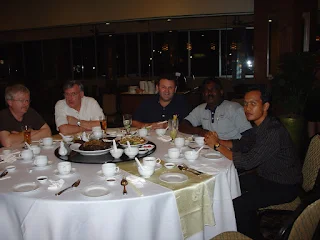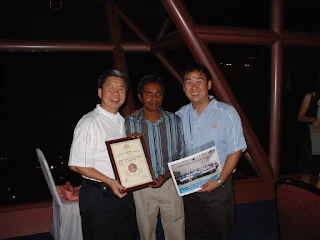Interviewer: Leena Rikkilä, IDEA Programme Manager for Asia


What is your background and involvement in the constitution building process in the Maldives?
I am a member of the Constituent Assembly (CA) since 2004, and elected Member of Parliament since 2004, as well as elected President of Youth Council of DRP (Dhivehi Rayyithunge Party) since 2006. Constitution making is currently on-going in the Maldives and we are about half way through the process. I am also the member of the constitution drafting committee of the CA, and lawyer by profession.
What are main constitution related issues in your own country at the moment?
The main issue that is currently debated is the system of governance and that will be decided by the people through a referendum on 16 September 2006. This is a very historical moment as it is only the second time in the history of Maldives that people can have their say through a referendum. Media campaigns started on 1 August. Our current system is often described as a presidential system but actually it is not a proper presidential system. In my view the three powers; executive, legislative and judiciary, should be clearly separated, and therefore I am advocating for a presidential system where these powers are separated. So the system of governance is the biggest constitutional issue at this very moment.
What did you find most useful in this course in terms of your own process?
In the course of this training, the difficulties and real challenges of the constitution making have become clearer. My own task as a member of the drafting committee and CA delegate has become much more clear, and my vision is crystal clear now: I can actually see the road ahead and what should be done! And I can see where the Maldivian process has been defaulting.
The sessions on participatory constitution making were very interesting: it was good to understand what a genuinely participatory process really means. It would be very useful to have a detailed training on the participatory process for CA delegates as well as for the civil society representatives in Maldives. Also, the theme of system of governance was very relevant for me. What was very helpful was to have all these materials in our folders: this type of material is very difficult to trace.
I was the only one from my political party to participate in this course and there are lots of other who would benefit from such a training. I believe training could really serve as an eye opener; how the constitution making is first and foremost a national rather than a party political endeavor.
We have 113 delegates, the work is on-going and we all need some expert advice regarding the technicalities and options for solutions. We could customize and tailor this training to CA delegates and it should take place before end of the year.
How will you share the outcomes of this seminar in your country?
I will share the handouts and materials with my political party and with the CA delegates. I will approach the media and talk to the journalists about how to get them more engaged with the process. In Maldives, it is very difficult to find any literature or books on this subject.
Bangkok, Thailand – during the training seminar on “Constitution Making in Asia”, 24 July - 4 August 2006
Copyright © 2004 Ibrahim Mohamed! Inc. All rights reserved.e-mail:ibumohd@gmail.com
I am a member of the Constituent Assembly (CA) since 2004, and elected Member of Parliament since 2004, as well as elected President of Youth Council of DRP (Dhivehi Rayyithunge Party) since 2006. Constitution making is currently on-going in the Maldives and we are about half way through the process. I am also the member of the constitution drafting committee of the CA, and lawyer by profession.
What are main constitution related issues in your own country at the moment?
The main issue that is currently debated is the system of governance and that will be decided by the people through a referendum on 16 September 2006. This is a very historical moment as it is only the second time in the history of Maldives that people can have their say through a referendum. Media campaigns started on 1 August. Our current system is often described as a presidential system but actually it is not a proper presidential system. In my view the three powers; executive, legislative and judiciary, should be clearly separated, and therefore I am advocating for a presidential system where these powers are separated. So the system of governance is the biggest constitutional issue at this very moment.
What did you find most useful in this course in terms of your own process?
In the course of this training, the difficulties and real challenges of the constitution making have become clearer. My own task as a member of the drafting committee and CA delegate has become much more clear, and my vision is crystal clear now: I can actually see the road ahead and what should be done! And I can see where the Maldivian process has been defaulting.
The sessions on participatory constitution making were very interesting: it was good to understand what a genuinely participatory process really means. It would be very useful to have a detailed training on the participatory process for CA delegates as well as for the civil society representatives in Maldives. Also, the theme of system of governance was very relevant for me. What was very helpful was to have all these materials in our folders: this type of material is very difficult to trace.
I was the only one from my political party to participate in this course and there are lots of other who would benefit from such a training. I believe training could really serve as an eye opener; how the constitution making is first and foremost a national rather than a party political endeavor.
We have 113 delegates, the work is on-going and we all need some expert advice regarding the technicalities and options for solutions. We could customize and tailor this training to CA delegates and it should take place before end of the year.
How will you share the outcomes of this seminar in your country?
I will share the handouts and materials with my political party and with the CA delegates. I will approach the media and talk to the journalists about how to get them more engaged with the process. In Maldives, it is very difficult to find any literature or books on this subject.
Bangkok, Thailand – during the training seminar on “Constitution Making in Asia”, 24 July - 4 August 2006
Copyright © 2004 Ibrahim Mohamed! Inc. All rights reserved.e-mail:ibumohd@gmail.com











